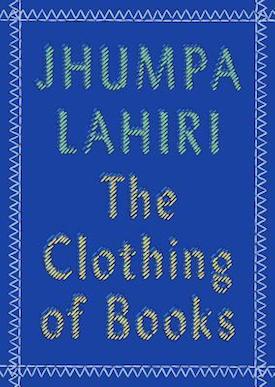Today, I’m talking to writers. Writers of books. Writers published and soon to be published. Writers who are debuting, have debuted, are a number of books in. Most of you can relate to or soon will be able to relate to this book that I’m going to talk about in a way that no one else will be able to. Why? Because your book has a cover that, while you may give input, most of the time you will have zero control over. And everyone has feelings about that. But this is the first time that I’ve seen this topic covered, these feelings shamelessly touched upon in a book. Writers. You need to pick up:
The Clothing of Books by Jhumpa Lahiri
I recently listened to the audiobook of this collection of essays by Jhumpa Lahiri, narrated by the author (thanks Random House Audio!) which was released November 15, 2016. The audiobook is only 59 minutes and there’s so much covered here within that hour. I really felt like I was listening to an author pour their heart out about a topic that is not often discussed and I can’t tell you how much I appreciated this. The audiobook is wonderful. The ebook is $2.99, if you’re looking for the best deal. Either way, add this book to Goodreads or your TBR list in your list. It’s a must read.
I know that when the cover makes its appearance, the book will be read. It will be criticized, analyzed, forgotten. Even though it exists to protect my words, the arrival of the cover, linking me to the public makes me feel vulnerable. The cover makes me aware that the book has already been read. Because in reality, the book jacket is not only the text’s first clothing but also it’s first interpretation, both visual and for sales promotion. It represents a collective reading by the book designer and various people at the publishing house.
In The Clothing of Books, Jhumpa Lahiri gets very candid about the somewhat taboo topic of authors and their true feelings behind their covers. She dives into the anxiety of anticipating the cover as well as the reaction, the emotions an author experiences when seeing their covers for the first time and how those feelings are ironed out over time and become a part of her. These are emotions that leave her more perplexed and infuriated than pleased. She talks about how a good cover makes her as the author feel listened to and understood while a bad cover can be suffocating or inadequate and like an enemy.
She’s open about her experience receiving a cover filled with cultural (in her case, Indian) stereotypes rather than the truth of the book that she wrote – a book where the main character is born and raised in the United States.
Lahiri, having spent her recent years in Italy and writing a number of books in Italian that were translated into English, I love the comparison she makes to a cover being a translation of the book. And how foreign editions are reflections of each nation’s identity, spirit, and tone.
In this book of essays, Lahiri explores how it’s easier to judge a cover than content and the varying effects that has on the author. She briefly explains why covers are changed between the hardcover and paperback editions and how she actually often connects more to and prefers bound galleys with generic blank covers rather than finished copies. She mentions her experience discovering that another author had the same cover as one of her books. I do wish she had gone more into detail on her feelings here, this didn’t seem fully fleshed out. Lahiri humbly discusses becoming her own cover, truly participating in the creation of a cover for the first time. She elaborates on her thoughts about why e-versions of books feel more like labels and I never even thought about that until now, it’s quite interesting to say the least.
On the other hand, she talks from the reader’s perspective, about being seduced herself and buying books solely based on the cover. She mentions facing books out rather than by the spine on her bookshelf in her home. She talks about wanting a more uniformed look for book covers. To this I say, covers are uniformed by genre and sadly, gender. The latter, I could do without. But I feel like they are already uniformed by genre and that’s enough for me. Anymore of a uniform would strip something away or pigeon hole it more, I think? I love how personal and subjective it all is and would love to know what you think in the comments.
There’s so much in this collection of essays to appreciate and ponder. Simply put, it’s nice to know that you, writer, are not alone and that your feelings on your cover, good or not so good, are completely valid. If you need that reminder, this book is a must have. So be sure to get your copy in paperback, e-book, or audiobook today.
The Clothing of Books by Jhumpa Lahiri is available now.
